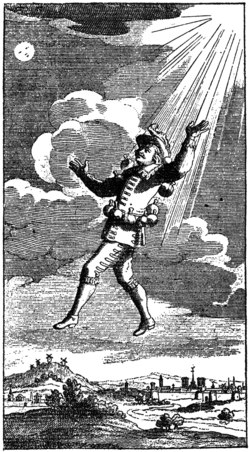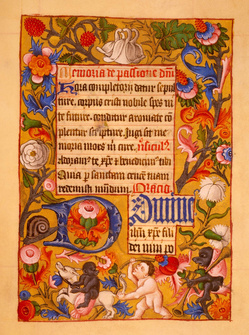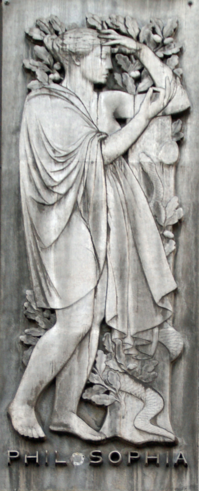What is the value of the humanities in a precarious economy? In other words, what do we value most — in terms of teaching and research — when times are tough? Immediate practicality? Measurable utility? Or do we look instead to lessons that can be gleaned from the study of language and literature, from other cultures, other systems of thought, that endure over distance and time?
 This issue has surfaced again and again in recent public conversations about the humanities. The New York Times, for instance, recently declared, “In this new era of lengthening unemployment lines and shrinking university endowments, questions about the importance of the humanities in a complex and technologically demanding world have taken on new urgency.”
This issue has surfaced again and again in recent public conversations about the humanities. The New York Times, for instance, recently declared, “In this new era of lengthening unemployment lines and shrinking university endowments, questions about the importance of the humanities in a complex and technologically demanding world have taken on new urgency.”
This questioning contains an implied juxtaposition, that it’s one or the other — that a choice must be made between economic justification and the enrichment that the humanities bring. But is this a valid opposition? And if the humanities must indeed justify their worth (as claimed by the Times), what do we mean by “worth”?
Read the speaker bios.
Download the full audio from the panel discussion.
Scott Coltrane: This forum today is designed to look at the relevance of the humanities. UO’s new president, Richard Lariviere, has said that part of the public perception challenge is that humanists have failed to make a case for the humanities, in part because they engage in esoteric debates over fine points that most of the public doesn’t understand. Similarly, the New York Times recently ran an article entitled “In tough economic times the humanities must justify their worth.” So, our question for today is, what’s the relevance of the humanities in an age of information technology and rapid social change — and particularly right now, in a time of economic uncertainty?
Barbara Altmann: I come at this from the perspective of a medievalist. I research and teach pre-modern French literature — my own area of expertise is 14th and 15th century narrative and lyric poetry, the study of texts in manuscript and of old and middle French philology. So from that perspective, I’ve had a lot of practice justifying my existence in the academy.
 We are very much a present-tense society. We have a strong bias toward thinking that today is better than yesterday. It’s a built-in human bias: the Renaissance rejected the Middle Ages, the Enlightenment rejected the Baroque and so on. We have a habit of rejecting and finding inferior what came before us. But there’s nothing like having a group of students walk around a table on which are displayed medieval manuscripts in all their glory, in all their fallibility, in all of their tattered state — to put them into a kind of confrontation with the material artifact from another era and suddenly wake up to the fact that the Middle Ages were not just barbarism and savagery — that there were technologies a thousand years ago that are superior in many of their mechanisms to the ones we have now, that are less ephemeral, far more lasting, with great intrinsic beauty. That’s one kind of an encounter that someone who works in early chronological periods like mine can bring to students who have a cultural memory of about 15 minutes.
My task, as I see it, is to make sure that our students begin to grow some kind of historical consciousness and memory that leaves us much less insulated in our own current crises, in our own current glories, and to begin to understand not only the large evolutions and shifts that have occurred, but also to go back to those original periods and discover their richness.
We are very much a present-tense society. We have a strong bias toward thinking that today is better than yesterday. It’s a built-in human bias: the Renaissance rejected the Middle Ages, the Enlightenment rejected the Baroque and so on. We have a habit of rejecting and finding inferior what came before us. But there’s nothing like having a group of students walk around a table on which are displayed medieval manuscripts in all their glory, in all their fallibility, in all of their tattered state — to put them into a kind of confrontation with the material artifact from another era and suddenly wake up to the fact that the Middle Ages were not just barbarism and savagery — that there were technologies a thousand years ago that are superior in many of their mechanisms to the ones we have now, that are less ephemeral, far more lasting, with great intrinsic beauty. That’s one kind of an encounter that someone who works in early chronological periods like mine can bring to students who have a cultural memory of about 15 minutes.
My task, as I see it, is to make sure that our students begin to grow some kind of historical consciousness and memory that leaves us much less insulated in our own current crises, in our own current glories, and to begin to understand not only the large evolutions and shifts that have occurred, but also to go back to those original periods and discover their richness.Bit by bit, I got more and more fascinated in the topic and along the way found myself doing research on the Dead Sea Scrolls. So why commit myself to a career studying ancient texts? These are texts over 2,000 years old, that are very fragmentary. The Dead Sea Scrolls may generate more interest than other ancient writings, but if you actually read them, most are incredibly boring. It takes a lot of work to get the goods out of them. But they do tell us a lot. The important point is that that they don’t tell us anything directly about people living today — these are ancient texts, they are not directly related to Jewish or Christian groups today, quite contrary to their popularity.
So why study them, if there’s not that direct link? In the classroom when we deal with the authors of the Dead Sea Scrolls, we are not dealing with any student’s direct ideological ancestors, but we can see that debates were heated back then just as they are now. It’s fascinating to see what they were wrestling with, the options chosen, and then what happened to them — this is a group that ceased to exist. Students often grasp important lessons more easily in this indirect way than if they felt they were directly studying their own tradition.

I find that studying the distant past helps us get a sense of bearing. We all share, despite our diversity, a great deal in terms of our common worldview. Being able to relavitize our worldview is extremely important to be able to think of different possibilities. To be able to get a sense of our placement, a sense of horizon, we need a distant perspective. As someone once said, “The distant future would be equally good — we just don’t have access to it.”
Lisa Freinkel: Human beings are meaning-making and meaning-seeking creatures; that’s just what we are. We are always looking for meaning. How do we do it? How do we do it ethically, responsibly, generously? To me, those questions of how and also the question of why — why do we want meaning so much? — are the core questions that started to turn my crank early, probably my freshman year of college, and led me into studying literature and ultimately becoming a professor of English.
I encountered that question most strongly in reading Augustine’s Confessions, which I read when I was 18 and which kind of ruined me for everything else I was going to read as a college student. There are two things in that book that were really striking: Augustine in the Confessions is praying to God and says something like, “Lord, I have become a problem to myself.” And this is the crux of it.
We are meaning-seeking beings and it starts with “me,” with a capital M. But the trick of humanistic study is to make that Me-centeredness become so thoroughgoing, so profound, so relentless and unwavering that that Me becomes a problem to itself — and then the Me becomes the whole world. In other words, the pursuit of understanding the self, pursued with courage and conviction, is a pursuit of understanding of the fundamentals of human life — of everything, of our whole wide universe.
The other thing that happened in the Confessions that got me going was the moment where Augustine — at the moment of his conversion, which he has been on the brink of his whole adult life — hears a voice. He is in the garden and maybe it is an angel, it’s a child’s voice saying, “Pick it up and read.” And he says to himself, “Ah ha! This voice is directed to me and it is saying pick up this book of Paul’s epistles at my side. I will pick it up and I will read whatever is there and I will take it as a lesson for Me!” That egoistic impulse to interpret the world around us as about Me is stunning. It seems to me that it is one of the things that motivates people to study literature: “What does this mean? How does it relate to me? What does it mean that it relates to me? On what basis can I make sense of this?”
That process of making meaning and justifying the meanings that we make — that is both what I study and what I am engaged in teaching. It is also, I think, really central to my understanding of what I do as a humanist: to refine that process, to understand that process, to teach that process of looking into meaning, justifying the meanings that arise, testing those meanings, trying them on for size, allowing that horizon of difference to turn the self into a problem to relativize our world view — and then, as a scholar, turning over the meanings into another text that someone else can read.
 Coltrane: I want to step back just a bit and ask the panelists how they each would define “humanities,” and perhaps the subtext of that is — because of the discussion thus far about meaning and values — is it different than it has been in the past?
Coltrane: I want to step back just a bit and ask the panelists how they each would define “humanities,” and perhaps the subtext of that is — because of the discussion thus far about meaning and values — is it different than it has been in the past?
Altmann: The obvious answer comes out f an exercise that I just undertook with my third-year literature survey class. When we leapt into the Renaissance we had to consider the notion of humanism — which is generally held up as the key characteristic of what defines the intellectual and artistic movement of the Renaissance — I always march them back, etymologically, to the Latin humanitas meaning, “that which is peculiar to or particular to or belongs to humankind.”
Now that is kind of a hedge that doesn’t necessarily tell us what is particular to humankind, but even though we may be in a sort of crisis about not being able to find true universals, I think at the very least we can say that every human society shares a preoccupation with values, kinship, narrative and cultural production of some sort. In other words, there are things that we can look for at any chronological period or in any geographical area.
For me, humanism is an approach rather than a subject area and that is very dramatically demonstrated in my work with the Humanities Center — and the fact that the faculty who have held Humanities Center fellowships with us come from almost every unit on campus, including those well outside the College of Arts and Sciences. We have had fellows from the Law School, from Journalism and Communications, from the School of Architecture and Allied Arts, from the School of Music and Dance, from departments that are technically in the Social Sciences or technically in the Natural Sciences. So, for me it is not a question of the field; it is a question of methodology and approach.
Falk: What the humanities, as an approach, are trying to do is get us to systematically ask questions relating to valuing and meaning. It differs from the hard sciences in that mostly you are not dealing with empirical data and there often are no right answers — which is one of the things that can make the humanities very difficult. It is a basic feature of being human that we constantly face questions of value and meaning — even in terms of the application of the sciences. The sciences can tell us what we can do and what will happen, but they cannot tell us if we should do such and such: we have a certain technology, should we employ it, and to what limits? The humanities don’t give us answers to these questions either, but they do give practice in addressing such questions in systematic and disciplined ways.
Freinkel: [Regarding the definition of humanities changing over time] a really interesting example is Renaissance humanism. The humanists of that time became really adept at thinking about the relative nature of the self. Shakespeare asked this question over and over again, the question of Ecclesiastes: Is there nothing new under the sun? Are we different from the past? Are we similar to the past? Where are there continuities? Where are there disjunctions? In the 16th century, they tried to build into the education of the average English grammar school boy a learning of Latin and a tiny bit of Greek; they were learning how to imitate the ancients; they were trying to figure out where they could connect with Cicero and how they were in rivalry with those guys. Why were they learning this? Why was humanistic education so popular in Tudor England? Because they had an expanding empire that needed functionaries, that needed civil servants.

One of the things that comes up in our contemporary debates about the crisis of the humanities is the notion that we are going to build critical thinking skills that are going to be very valuable for people out in the work force. But those kinds of arguments were around in the 16th century. And those kinds of arguments, it seems to me, have threatened the life of the humanities from its very inception.
Those arguments about utility — the value in economic and political terms of being able to read well, write well, think critically — if we use those kinds of rationales to measure our activity, we are not doing anything new, as it turns out. So there is a kind of crisis at the core that has to do with the issue of the value of the humanities, in utilitarian terms, but it is not going away, precisely because it is not new.
Coltrane: Let’s talk a little bit more about that critique. So, the story goes, why should I send my kid to the UO or anywhere else to learn “useless” information and feel good about poetry or understand philosophy — what is it going to mean for the bottom line? Do you buy that practical versus abstract, applied versus theoretical argument? How do we respond to that? Does it deserve a response?
Freinkel: I think it has to be responded to. At its extreme, the argument for utility turns humanities departments into the service arm of the university. We are the place where you learn critical thinking skills. We are effectively general education and general education is nothing that we really care about. Why do you take English classes? So you can learn to write and communicate well. Why do you do that? So that you can ultimately graduate with a degree that has a market value and then get a good job. Well, first of all, the veracity of that argument seems to be something that we really want to question. And it is also soul-killing, it seems to me.
The students who end up coming into humanities departments with a kind of spark in their eye about majoring in those fields — what is animating them? If we don’t find a way to publicly cherish and value that “something,” not only are we shooting ourselves in the foot, we are effectively pulling the rug out from under our own students. How do we honor that publicly? They are not there to get critical thinking skills.
Falk: Part of the argument that Stanley Fish [literary theorist and New York Times blogger] makes, which has generated a lot of discussion, is that many of the utilitarian arguments fail when you actually start pushing them. There really is no evidence that the humanities make people necessarily better critical thinkers or wiser people. Some want to say humanities will make you less prejudiced or less inclined to engage in wars. Fish points out that often the people who get us into wars are well-read, well-educated people. So that argument doesn’t really work.
Fish answered honestly for himself why he does what he does (he is a humanities professor): it is for his own enjoyment and he doesn’t need any justification. I buy that to a certain extent — although I think he shortchanges the question of really making a case for it. It is not just, “I enjoy it, therefore I do it.” He raises the question of why the public should pay us for doing what we enjoy, and that is a good question. Just because I enjoy it doesn’t mean that anyone else should pay me for it. But, there are some things that need protection, that are good for our society — part of what is just a public good even if there is no immediate justifi cation, like preserving wild species. A certain space has to be kept for certain things that by themselves need to be there.
Altmann: As Lisa said, this is a debate that keeps getting recycled over the centuries. My answer is really the obvious one — that there are different kinds of economies and the dollar figure is not necessarily the bottom line. That is so obvious to all of us who are engaged in this endeavor, but the real question, which arises again and again is: What is wealth? Wealth is not necessarily measured by a particular bank account or by a particular figure on a page. We are talking about a different kind of wealth and different kind of economy and it just depends on where we are putting our values in a given moment in cultural transformation. ■
Read the audience Q&A.


 Watch Ian McNeely's talk at Google, Inc. and read a chapter from his book, Reinventing Knowledge.
Watch Ian McNeely's talk at Google, Inc. and read a chapter from his book, Reinventing Knowledge.